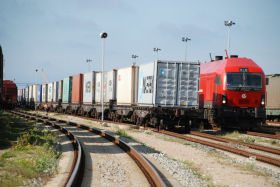Baltic States – CIS, Belarus, Cargo, Logistics, Oil, Port, Railways, Russia, Transport
International Internet Magazine. Baltic States news & analytics
Friday, 26.04.2024, 02:06
Lithuania's Lietuvos Gelezinkeliai expects to hold on to Belarusian cargo
 Print version
Print version |
|---|
"As to competition and the intentions of Russian
railways to slash prices by a fourth, time will show. Our position is to work
with clients, regardless of politics or similar factors. We believe we will
find a solution and ways of being leaders in our region," LG said in a comment.
According to the company, the loss of Russian oil freight would
not be a major failure, however, loss of ferry cargo from Belarus would be a
bigger threat. Lietuvos Gelezinkeliai
says it carried nearly 250,000 tons of oil products from Russia to Lithuania's
Klaipeda port last year.
Lietuvos Gelezinkeliai
could not specify whether the Russian railway company's aim to lure the
Belarusian cargo was due to economic or political logic.
"It is difficult to give a clear answer whether it is
competition or political logic. Clearly, the competition environment over the
past 5-10 years is on the rise, with tensions growing. Political factors are
just as important. More expensive cargo are indeed directed to the Ust Luga
port in the Gulf of Finland some 100 km from St. Petersburg. The port's loading
volumes multiplied from 11.7 mln tons in 2010 to 87.8 mln tons in 2015,"
the company said.
The company said Russia's strategy to carry cargo via its
own ports had been known earlier and had caused damage to Latvian and Estonian
railways. Lietuvos Gelezinkeliai said
Latvian railway flows dropped by 19.6
% in the first nine months of this year, while Estonian declined by 20%.
Meanwhile, Lithuanian railways posted
a cargo volume increase of 0.4%.








 «The Baltic Course» Is Sold and Stays in Business!
«The Baltic Course» Is Sold and Stays in Business!

